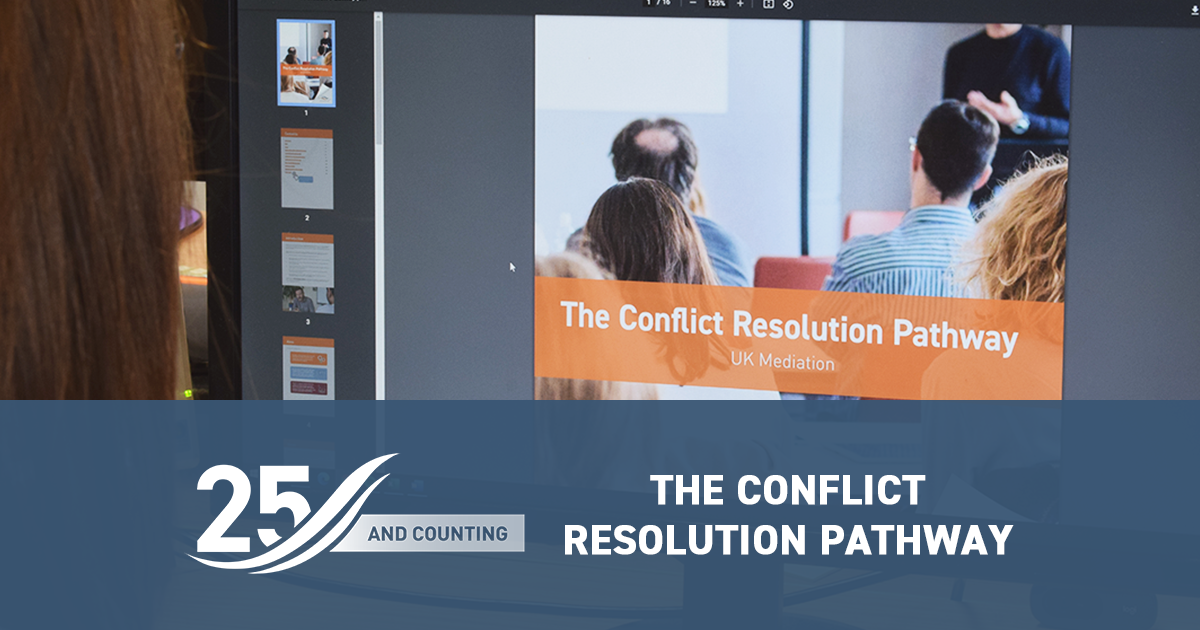
Posted on: August 19th, 2024

To celebrate our 25th Anniversary this year, we sit down with Founder, Dr Mike Talbot, to look back at some of the key moments in UK Mediation's history.
In the eighth entry of this series, we look at the launch of UK Mediation's Conflict Resolution Pathway.
1. UK Mediation launched The Conflict Resolution Pathway in 2021. How did the Pathway come about?
Dr Mike Talbot: We were finding more and more that, rather than just encouraging our client organisations to make greater use of mediation, we were actually proposing that they should take every possible step to informally resolve conflict even before considering mediation.
We had designed our unique Confident Conversations course to empower individuals to address conflict themselves with another person and had also completed a number of pieces of work where we set up systems for client organisations to be able to run Resolution Meetings, again without needing full-blown mediation. Some of this was driven by what we saw as an inherent resistance to mediation from the individuals who were in conflict, and we wanted to respect this at the same time as still encouraging early and informal resolution.
When we put these early, self-directed interventions together with our other well-established training programmes and third-party-directed resolution services, the notion of a Pathway came about.
2. What are the benefits to an organisation who might choose to implement the Pathway?
MT: First of all, the Pathway puts the emphasis on the early and constructive resolution to disputes, instead of always considering conflict as an adversarial battle. So, the Pathway encourages people who come into conflict to negotiate and collaborate, rather than to take up opposing sides and to try and ‘win’. This provides the possibility of a cultural shift towards how conflict is addressed: by seeking mutually-agreed resolution rather than by attributing blame and fault.
Secondly, the Pathway is about empowerment of the individual to take control and responsibility for managing their own working relationships. This represents a move away from a grievance-based approach, where people hand their conflict over to more senior others to resolve, and a shift towards supporting and empowering the individual to address relationship challenges for themselves. Ultimately, this leads to people developing better resilience to conflict, and a greater level of what we like to refer to as 'Conflict Competence'. The offshoot of this is that individuals are more inclined to walk towards a conflict situation, instead of avoiding it or feeling that the only way that resolution might be reached is by having the conflict taken out of their hands.
And thirdly, the practical benefit of implementing adopting the Pathway is that HR and ER professionals, managers, team leaders and others have to spend less time themselves on addressing interpersonal conflict and processing formal grievances. Individuals will often need support, encouragement, and practical help to resolve their conflict informally, but in many cases, HR does not even need to get involved.
3. With UKM's help, dozens of organisations have now implemented the Pathway into their policies and procedures. What has the feedback been like?
MT: We developed the Pathway in collaboration with client organisations from the public and private sectors; in education, housing, the NHS, and with many other partners. Consequently, when we rolled out the Pathway, there was a definite sense of ‘Yes, this is exactly what we need’.
On a practical level, we have lots of long-term feedback that implementing the Pathway has reduced formal grievances, aided employee retention, and eased the amount of time that HR, managers, and others have to spend on resolving conflict. Encouragingly, a lot of that feedback has also mentioned that the Pathway has contributed to a cultural shift: away from the notion that conflict is bad, destructive, and something to be avoided, and towards the idea that addressing and resolving conflict at the earliest point and at the lowest level is highly beneficial to any organisation.
4. Where can people find out more about The Conflict Resolution Pathway?
MT: We have a dedicated page on our website where people can find out more, as well as request a free copy of the Pathway itself. There is also a webinar about the Pathway in our webinar archive, which provides a guided walkthrough of each stage.